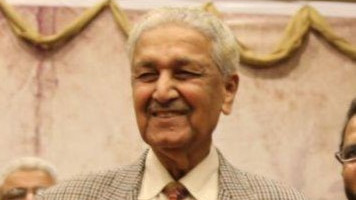Abdul Qadeer Khan, a metallurgist who became known to western intelligence services as the father of Pakistan’s nuclear bomb and a worldwide dealer in weapons technology, died on Sunday at a hospital in Islamabad. He was believed to be 85 years old.
Dr Khan’s death was reported by Pakistan’s interior minister, Sheikh Rasheed Ahmad. The apparent cause was complications from Covid-19, he said.
Dr Khan was the man who made Pakistan a nuclear power. For at least 25 years, starting from scratch in 1976, he built, bought, bartered and stole the makings of weapons of mass destruction.
To millions of Pakistanis, he was a national hero, the man who developed a nuclear programme to match India. To the CIA, he was one of the more dangerous men on earth.
Pakistan Prime Minister Imran Khan on Sunday said he was “deeply saddened” by Dr Khan’s death, praising him for “his critical contribution in making us a nuclear weapon state”.
“This has provided us security against an aggressive, much larger nuclear neighbour,” Khan tweeted, referring to India. “For the people of Pakistan he was a national icon.”
In a 2010 interview with Geo TV, a private Pakistani television network, Dr Khan said he had been motivated by the events of 1971, when Bangladesh, then known as East Pakistan, broke away to become an independent country following a bloody civil war in which Indian forces backed the separatists.
“My objective in making the atomic bomb was that Pakistan becomes safe,” he said. “I wanted that what happened in 1971 should never be repeated again.”
In March 2001, President Pervez Musharraf of Pakistan, under pressure from the US, said he had forced Dr Khan from his post as the head of the country’s national nuclear laboratory. But he remained a scientific adviser to the Musharraf government, and his ability to sell or barter nuclear technology continued.
The CIA had long suspected “that Khan was sharing his deadly expertise beyond Pakistan’s borders”, the former CIA director George J. Tenet wrote in his 2007 memoir. “His range of international contacts was broad — in China, North Korea, and throughout the Muslim world.” The CIA believed “that he was trading nuclear expertise and material for other military equipment — for example, aiding North Korea with its uranium-enrichment efforts in exchange for ballistic missile technology.”
An international effort led by British and American intelligence agencies uncovered parts of the Khan network at the start of the 2000s. It discovered a global web of scientists, front companies and factories that it believed had transferred weapons technology to Iran, Libya, South Africa and North Korea.
The great fear was that a terrorist organisation such as al Qaida would buy or steal the makings of a nuclear weapon.
Abdul Qadeer Khan was born in Bhopal, India, in either 1935 or 1936; the date is uncertain. After the partition of India in 1947, he was raised in Pakistan.
In 1974, he was working in Amsterdam at a company that enriched uranium for a European consortium of nuclear-engineering firms. That same year, India tested its first nuclear weapon.
“When India conducted its nuclear explosions in 1974 and I felt that Pakistan’s security is in danger, I left everything and came back here,” Dr Khan said.
He returned to Pakistan with two sets of blueprints for building centrifuges to enrich uranium. According to a later investigation by the Dutch government, those were the first of a series of nuclear-weapons designs and technologies that Dr Khan purloined from abroad.
On May 1, 1981, Gen. Mohammad Zia ul-Haq, the military ruler of Pakistan, renamed the nation’s nuclear-research complex as the Dr A.Q. Khan Research Laboratories.
Pakistan exploded its first nuclear device on May 28, 1998, in response to an Indian nuclear test. By that time, Dr Khan had become an international pariah.
New York Times News Service










